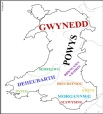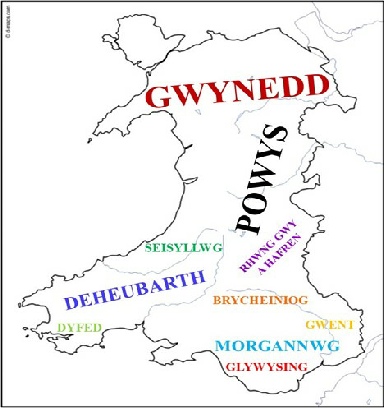850 Viking Attacks
The first recorded Viking attack on Cymru was around 850, but there were most probably many earlier ones than this. Rhodri Mawr also faced a Saxon attack in 853 led by Burgred of Mercia and Aethelwulf of Wessex.
Viking attack on Cymru was around 850, but there were most probably many earlier ones than this. Rhodri Mawr also faced a Saxon attack in 853 led by Burgred of Mercia and Aethelwulf of Wessex.
856 Battle of Llandudno
Rhodri Mawr defeated a force of Viking invaders, killing their leader Horm, in a battle at Llandudno, but, by 865, the Saxons had managed to drive him from Ynys Môn - although he managed to return shortly afterwards to reclaim it.
878 Death of Rhodri Mawr
Rhodri was forced to flee to Ireland after being defeated by Vikings in 877, but he returned to Cymru in 878 and was killed in battle against Ceolwulf of Mercia. After Rhodri’s death, his lands were divided between his sons, with his eldest son, Anarawd, inheriting Gwynedd and Cadell, another son, inheriting Seisyllwg.
881 Battle of Conwy
Anarawd ap Rhodri and his brothers defeated a Mercian army led by Aethelred on the west bank of the river Conwy; this battle was also known as ‘Dial Rhodri’ (or ‘Vengeance for Rhodri’). Like his father, Anarawd was known for defending his lands from Viking attacks.
916 Attack on Brycheiniog
The Mercians were still attacking into Cymru into the 10th century. In 916, Aethelflaed of Mercia, Aethelred’s daughter, sent an army into Brycheiniog which destroyed its capital at Llyn Safaddan (Llangorse Lake). This attack was to avenge the killing of Abbot Egberht and his companions in the area, and Tewdwr ap Elisedd’s wife was captured and held hostage along with 33 others.
920 House of Deheubarth
After Cadell ap Rhodri’s death in 909, his sons, Hywel and Clydog, inherited Seisyllwg in the south-west. When Clydog died in 920, Hywel then founded the house of Deheubarth, which incorporated Seisyllwg and Dyfed.
930 Hywel ap Cadell (Hywel Dda)
When Tewdwr ap Gruffudd of Brycheiniog died, Hywel appears to have ruled that kingdom as well. And finally, when his cousin, Idwal Foel ab Anarawd, was killed by the English in 942, Hywel also controlled Gwynedd and Powys. Only Glamorgan and Gwent in the south-east were outside his rule.
942 Morgannwg
In 942, Morgan ab Owain (Morgan Hen), united the kingdoms of Glywysing and Gwent in the south to form the kingdom of Morgannwg. After Morgan’s death, however, it reverted to its separate kingdoms and stayed so until 1055.
The 10th century also saw the emergence of the area known as ‘Rhwng Gwy a Hafren’ (‘Between the rivers Wye and Severn’). It is thought that it was founded by Elystan Glodrydd and that it occupied the land now covered by Sir Faesyfed (Radnorshire).
945 Cyfraith Hywel (The Laws of Hywel Dda)
There is a strong tradition that Hywel oversaw the codification of a comprehensive legal system for Cymru at Hendy-gwyn ar Daf (Whitland). This was probably done with the help of clerics, such as Blegywryd and Cynyr ap Cadwgan, and some of these laws were still in use in the 16th century.
950 Death of Hywel Dda
Following Hywel’s death, a conflict started between his sons and the sons of Idwal Foel, with battles taking place at Nant Carno (951) and Llanrwst (954). These resulted in victories for Ieuan and Iago ab Idwal Foel, and they continued to rule Gwynedd.
988 Maredudd ab Owain
Owain ap Hywel Dda died in 988 and was succeeded as king of Deheubarth by Maredudd, his son. Maredudd had already conquered the kingdoms of Gwynedd and Powys on behalf of his father, and so he then controlled roughly the same area of Cymru as his grandfather, Hywel Dda.
999 Battle of Pont Rhymni
Maredudd was killed in a battle with a Saxon force at Pont Rhymni in Caerdydd, and then Cynan ap Hywel, a descendant of Idwal Foel, took back control of Gwynedd.
1018 Battle of Caer Seon
Llywelyn ap Seisyll defeated and killed Aeddan ap Blegywryd of Ynys Môn at the battle of Caer Seon, possibly near Conwy. This gave Llywelyn control of Gwynedd and Powys.
1022 Battle of Abergwili
After he defeated Rhain the Irishman at the battle of Abergwili near Caerfyrddin, Llywelyn ap Seisyll also controlled Deheubarth.
1023 Death of Llywelyn ap Seisyll
Llywelyn died in 1023, and little is known about his life, but his son, Gruffudd, was to become the only person to rule as king of the whole of Cymru.
1039 Battle of Rhyd-y-groes
Iago ab Idwal of Gwynedd was supposedly killed by his own men, and his son, Cynan, was forced into exile in Dublin. Gruffudd ap Llywelyn then became king of Gwynedd and Powys and, almost immediately, fought and defeated Edwin of Mercia at the battle of Rhyd-y-groes, on the border near Trefaldwyn (Montgomery).
1041 Battle of Pencader
Gruffudd ap Llywelyn then went on to defeat Hywel ab Edwin of Deheubarth in a battle at Pencader.
1044 Battle of Aber Tywi
Gruffudd defeated Hywel again at the battle of Aber Tywi near Caerfyrddin, where Hywel was killed.
1052-1056 Attacks against Saxons and Normans
Gruffudd ap Llywelyn attacked towns across the border, including Leominster in 1052 and Hereford in 1055, and he also defeated an army led by Leofgar and Aelfrith of Hereford at a battle to the south of Castell Paen (Painscastle) in 1056. By 1055, Gruffudd had defeated and killed Gruffudd ap Rhydderch of Gwent, and so controlled the whole of Cymru.
The campaigns across the border may well have been triggered by the arrival of Norman settlers in the area, which was seen as a threat. Afterwards, all the English villages in the area were abandoned to the Cymry, probably as a result of Gruffudd’s raids.
1063 Death of Gruffudd ap Llywelyn
Harold and Tostig Godwinson of Wessex led an army into Cymru and forced Gruffudd take refuge in Eryri. It was here that he was killed in 1063 - possibly by Cynan ap Iago, who had returned from exile in Ireland.
Gruffudd’s death led to Cymru being divided back into its individual kingdoms: Gwynedd and Powys (co-ruled by Bleddyn and Rhiwallon ap Cynfyn); Deheubarth (Maredudd ab Owain ab Edwin); Morgannwg (Caradog ap Gruffudd); Gwent (Cadwgan ap Meurig) and Rhwng Gwy a Hafren (Idnerth ap Cadwgan).
Cymru then entered ‘Oes y Tywysogion’ - ‘The Age of the Princes’.



